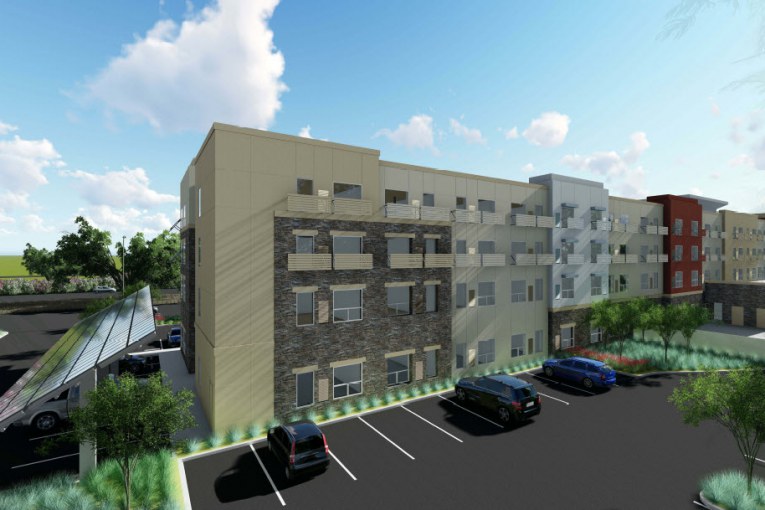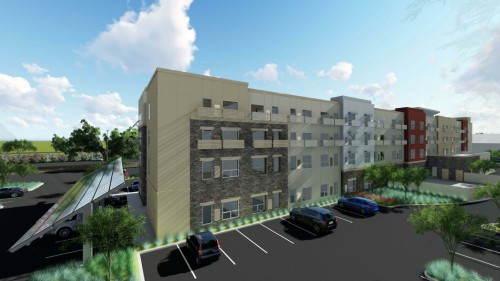

One thing that has been consistent is the strong support of development on the editorial pages of the local newspaper. In fact, we can argue that the paper is much more pro-growth than either its readership base or the city as a whole. So there is no surprise that the paper’s editorial on Friday came out strongly in favor of the proposed hotels.
The paper believes, “Hotels would bring city some much-needed revenue.” Davis, the editorial notes, “which long has been short on visitor accommodations, seems to be spoiled for choice with not one, but two extended-stay hotel proposals going before the City Council.”
While the proposals are similar in that they both offer four-story hotels with 120 rooms, “the two projects have drawn starkly different feedback from the community and city commissions. Two recent city staff reports on the projects recommend approval of both projects.”
The editorial offers us some more detail on the need for hotels, in particular with regard to the notion of leakage – which has been claimed in various forms of discourse, but not empirically demonstrated.
The editorial begins with the idea that there are no extended-stay options for any of the city’s existing hotels. Developers, they write, “envision their projects to provide much-needed space for traveling professors, entrepreneurs and family members of residents visiting Davis, and to capture some of the ‘hotel leakage’ into neighboring communities. “
They then cite a detailed breakdown from the Davis Legacy Soccer Club which shows “that 73 percent of the visitors for its six tournaments last year stayed outside of Davis. Revenue for these 2,952 room nights is going elsewhere. And that’s just one youth soccer organization, before it expanded its field complex from seven to 16.”
“What else are we losing?” they ask.
“An analysis of Davis’ hotel market done earlier this year declared that alongside the already approved Embassy Suites hotel/conference center at Richards Boulevard and Olive Drive, the city has capacity for one extended-stay hotel in the next few years,” they write. “But the developers think Davis has enough need for both hotels. They’re willing to take the risk.”
The editorial quotes Dan Carson, “If both projects (Hyatt House and Marriott Residence Inn) are found to meet the city’s criteria, the available evidence suggests that it is possible that both projects could succeed in the Davis market.”
The editorial turns to the specifics of the projects.
The Residence Inn, they note, “out in a commercial zone, faces the fewest hurdles.”
Meanwhile, the Hyatt House “faces more organized opposition from nearby neighbors.”
They write, “Hyatt developers, meanwhile, have addressed privacy issues with some design changes and window screens to block views into neighboring yards, which also would be separated by 50 feet of parking lot and 60 feet of greenbelt. Setting back the top story could reduce visibility even more.”
They conclude, “Each of these hotels could generate $1 million in ongoing revenue for city coffers; money that could go to roads, parks and all of the other underfunded needs plaguing Davis. In addition, they could ease the demand for medium-term rentals that are helping drive our community’s abysmally low vacancy rate.”
Clearly, the editorial was written prior to the staff report which pushes the Residence Inn discussion to December 6 and the Hyatt House option to December 20.
The editorial isn’t going to change anyone’s mind on this issue. The one new piece of information is the breakdown of the soccer club’s visitors going out of town. That is the first statistical analysis we have seen of the impact of leakage and we imagine that the impact goes far wider than one soccer organization.
This is the type of information about which we should have analysis. While I appreciate the work of Mr. Carson, getting a handle on the leakage figures would be extremely helpful.
The shortcomings of this editorial, however, are stark. Basically, what we have seen play out since August is a similar song and dance. The proponents of the Hyatt House hotel cite as evidence the overall need for revenue and the benefits to the community that a hotel would bring.
The opponents of the hotel do not dispute this – in fact, they seemed overall to be impressed by the project. Their objection is not to the project, but the location.
We can agree or disagree on the points about the location. But the editorial punts on this issue altogether – merely noting the opposition from the neighbors and the response from the developers in addressing privacy concerns.
Where the neighbors seem to have lost on this issue is that, back in August and September, they could argue that the location makes no sense – it is far from amenities, it is far from freeway access, and it is not a convenient drive to demand generators.
But that has changed. Now with Fulcrum Property and Mark Friedman’s lofty investment in the University Research Park, you have demand generators an easy half mile drive from the proposed hotel and only two relatively small other hotels in the area. There are restaurants and food near the Research Park location and that represents a huge factor that perhaps was enough to flip support in the direction of the hotels.
That point was completely missed by the editorial, and yet it may end up being the single greatest factor in the council’s possible ultimate support of the project.
—David M. Greenwald reporting

“The editorial isn’t going to change anyone’s mind on this issue.”
I would not be too quick to minimize the potential effect of this kind of article. I continue to go back and forth in my ind over the Hyatt project. I try to keep as open a mind as possible on each project and pay attention to the particular strengths and weaknesses of any project. The information regarding the breakdown of soccer clubs visitors is useful to me and these small pieces of information could definitely inform my opinion even if buried in a typical Enterprise “rah-rah” development piece.
of course they do, more folks more newspapers will be sold, or given away, right?
I think the opposite is true, readership is way down.
I don’t understand why we don’t have a better handle on leakage rates, that would seem the crucial variable for hotels